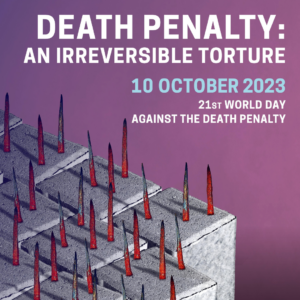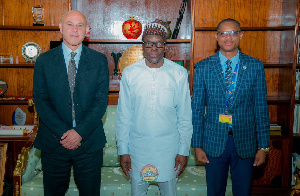
Public opinion and the death penalty
- News
- 26 Oct 2018
Read The Death Penalty Project’s written statement to the United Nations Human Rights Council on the question of public opinion and the death penalty:
The direction of international law on the death penalty is clear and is best illustrated by Article 6(6) of the International Covenant on Civil and Political Rights, which calls upon State parties to progressively restrict the use of capital punishment with abolition the ultimate goal. However, many countries that retain the death penalty cite perceived public support for the punishment as a key barrier to progress towards abolition. These States argue that restricting or abolishing the death penalty when the majority of citizens support capital punishment risks, among other consequences, undermining public confidence in the rule of law.(2)
That these concerns are misplaced has been highlighted before the Human Rights Council: in his opening remarks to the Council’s first high-level panel discussion of the death penalty in 2013, former Assistant Secretary-General for Human Rights Ivan Šimonović urged Member States not to rely on opinion polls in favour of retention, noting that public opinion can be based on misconceptions and that empirical evidence proves “the more a population was aware of facts, the less it supported the death penalty”(3). Similarly, in her remarks opening the same panel discussion a year prior, former High Commissioner for Human Rights Navi Pillay highlighted the “undisputed historical precedent” of State practices incompatible with human rights standards being abolished notwithstanding public support for them and noted further that “leaders must show the way [on] how deeply incompatible the death penalty is with human dignity.”(4)
While The Death Penalty Project welcomes any critical attention paid to the public opinion dilemma, it strongly encourages the Council to address this issue with greater urgency and scrutiny. The Death Penalty Project urges the Council to remind States of their commitments to progressive restriction of the death penalty and compliance with human rights safeguards governing implementation.(5) More specifically, we urge the Council to affirm – unequivocally – that although public opinion is to be respected, it should not determine an issue which must be dealt with on a principled interpretation of human rights in accordance with that State’s commitments under international law, for two key reasons:
First, the simple ‘for or against’ questions that form the basis of many opinion polls overlook important nuances to public opinion which have been made clear by more rigorous studies. It is clear, for example, that responses to these questions are often informed by a lack of knowledge and misunderstanding about the nature of the death penalty. In Japan in 2015 for instance, out of 1,542 survey respondents, only nine answered all five questions on the death penalty put to them correctly.(6) Similarly, a 2012 survey found that most Malaysians report being not well informed about the death penalty in their country, and in fact the majority of survey respondents were unaware that the punishment was mandatory for certain offenses.(7) It is unsurprising, then, that increased knowledge of the death penalty, including of the inevitable problems with its administration, has been shown to cause dramatic shifts in public attitudes: in Trinidad and Tobago in 2010, when asked whether they would still favour the death penalty if evidence became available to prove that innocent people have sometimes been executed, the percentage of survey respondents who would then support the death penalty decreased from 89 to 35 percent.(8) Public opinion polls based on “for or against” questions also do not gauge strength of opinion and interest in the issue (in Malaysia in 2012 and Singapore in 2016, both countries in which the public is widely considered to support the death penalty, only eight and five percent of survey respondents, respectively, reported as being very interested in or concerned with the issue).(9) They also overlook whether preferences withstand confrontation with different scenarios (a 2012 survey in Malaysia asked respondents to judge 12 scenarios of typical cases for which the penalty is mandatory death, and only 1.2 out of 100 imposed death in all cases).(10) Perhaps most importantly, “for or against” polling does not answer whether – as is often proven to be the case – a majority of the retentionist public would still accept abolition as legitimate (a scenario true, for instance, in Zimbabwe, where 80 percent of those who answered in favour of retention in response to a 2017 survey also reported that they would accept abolition if the government so decides).(11) Overall, more rigorous investigation into the nuances of public opinion tends to show that the public are far less resistant to the abolition of the death penalty as is often portrayed.
Second, and in any event, perceptions of public opinion cannot lead the debate on the death penalty or justify departure from human rights commitments – political leadership must be exercised. Governments should not continue to cite populist sentiment as a justification for neglecting their commitments to human rights. In this regard The Death Penalty Project echoes the former Independent Expert on the promotion of a democratic and equitable international order, Alfred-Maurice de Zayas: “‘democracy does not simply mean that the views of a majority must always prevail’….democracy must not be abused to diminish human rights, e.g. by legitimizing torture or capital punishment, even if public opinion could be invoked or manipulated to demand it”.(12) Political leadership – not organic shifts in public opinion – is necessary if governments wish to restrict and ultimately abolish the death penalty. Indeed the experience internationally is that abolition has been the responsibility of political leaders exercising their judgment based on an informed and rational appreciation of the case for abolition, irrespective of public demand or even support for it. The public invariably comes to accept abolition and support for capital punishment subsequently diminishes as the punishment comes to be regarded as outdated.
In conclusion, The Death Penalty Project respectfully urges the Human Rights Council to:
– Call on all States which retain the death penalty to ensure transparency in its use, in accordance with the safeguards on the death penalty as articulated in, inter alia, ECOSOC Resolution No. 1989/64 and UNCHR Resolution No. 2005/59, in order ensure informed public discourse on the practice of capital punishment.
End notes
(1) UN General Assembly, International Covenant on Civil and Political Rights, 16 December 1966.
(2) Member States who retain the death penalty have repeatedly cited public opinion as a reason for retaining the death penalty, including before the Human Rights Council. See, for example, Human Rights Council, High-level panel discussion on the question of the death penalty: Report of the United Nations High Commissioner for Human Rights, 4 July 2017, U.N. Doc. A/HRC/36/27 at ¶ 25 and report from 2015 panel discussion, 16 July 2015, U.N. Doc. A/HRC/30/21 at ¶ 30.
(3) Human Rights Council, High-level panel discussion on the question of the death penalty: Report of the United Nations High Commissioner for Human Rights, 16 July 2015, A/HRC/30/21 at ¶ 5.
(4) Opening remarks of Ms. Navi Pillay, United Nations High Commissioner for Human Rights to the High-Level Panel Discussion on the Question of the Death Penalty, available online at: www.ohchr.org/en/NewsEvents/Pages/DisplayNews.aspx?NewsID=14339&LangID=E.
(5) See ECOSOC Res. Nos. 1984/50, 1989/64 and 1996/15. See also ICCPR, n.1 at Art. 6.
(6) Mai Sato and Paul Bacon, The Public Opinion Myth: Why Japan retains the death penalty (2015) at 35.
(7) Roger Hood, The Death Penalty in Malaysia: Public opinion on the mandatory death penalty for drug trafficking, murder and firearms offences (2013) at 8-9.
(8) Roger Hood and Florence Seemungal, Public Opinion Survey on the Mandatory Death Penalty in Trinidad (2011) at 34.
(9) Ibid. at 8-9; Wing-Cheon Chan, Tan, Ern-Ser Tan, Jack Lee and Braema Mathi, “How Strong is Public Support for the Death Penalty in Singapore”, Asian Journal of Criminology (Published online 11 October 2017) https://link.springer.com/article/10.1007/s11417-017-9260-y at Table 1.
(10) Roger Hood, n.8 at 24-27.
(11) Mai Sato, 12 Years Without an Execution: Is Zimbabwe Ready for Abolition?: A survey of public attitudes towards the death penalty (2018) at 34.
(12) Human Rights Council, Report of the Independent Expert on the promotion of a democratic and equitable international order, Alfred Maurice de Zayas, 1 July 2013, U.N. Doc. A/HRC/24/38 at ¶ 18 (quoting European Court of Human Rights, Case of Leyla Sahin vs. Turkey, Application no. 44774/98, para. 108).
The Death Penalty Project has special consultative status before the United Nations ECOSOC.




















